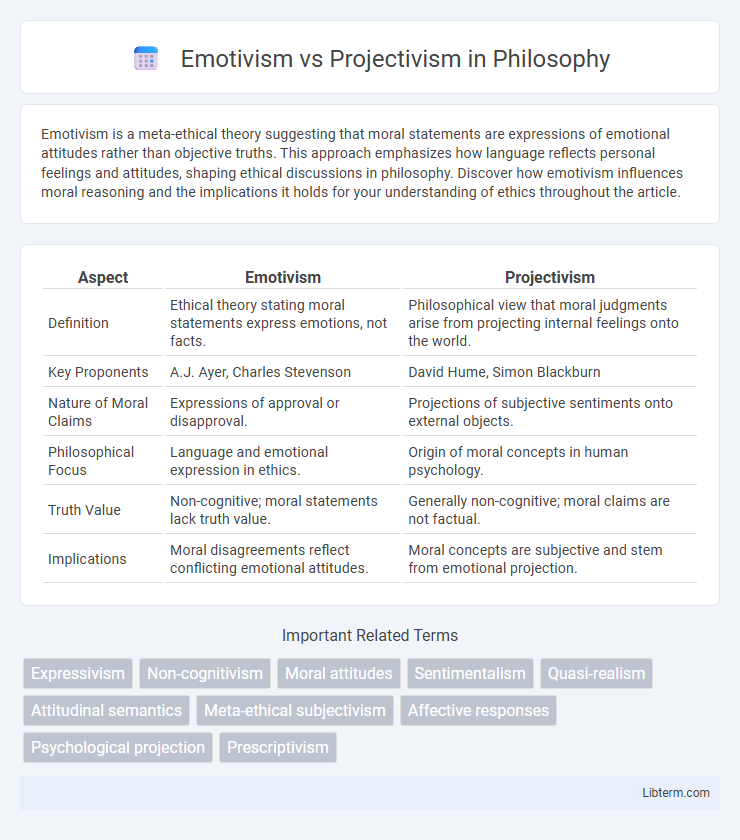Emotivism is a meta-ethical theory suggesting that moral statements are expressions of emotional attitudes rather than objective truths. This approach emphasizes how language reflects personal feelings and attitudes, shaping ethical discussions in philosophy. Discover how emotivism influences moral reasoning and the implications it holds for your understanding of ethics throughout the article.
Table of Comparison
| Aspect | Emotivism | Projectivism |
|---|---|---|
| Definition | Ethical theory stating moral statements express emotions, not facts. | Philosophical view that moral judgments arise from projecting internal feelings onto the world. |
| Key Proponents | A.J. Ayer, Charles Stevenson | David Hume, Simon Blackburn |
| Nature of Moral Claims | Expressions of approval or disapproval. | Projections of subjective sentiments onto external objects. |
| Philosophical Focus | Language and emotional expression in ethics. | Origin of moral concepts in human psychology. |
| Truth Value | Non-cognitive; moral statements lack truth value. | Generally non-cognitive; moral claims are not factual. |
| Implications | Moral disagreements reflect conflicting emotional attitudes. | Moral concepts are subjective and stem from emotional projection. |
Introduction to Emotivism and Projectivism
Emotivism asserts that moral statements express emotional attitudes rather than objective truths, emphasizing how ethical language functions to influence feelings and actions. Projectivism holds that moral judgments project subjective emotional responses onto external situations, treating these sentiments as if they are properties of the world. Both frameworks challenge traditional moral realism by grounding ethics in human psychology and emotional expression.
Historical Background and Philosophical Roots
Emotivism emerged in the early 20th century, primarily through the works of A.J. Ayer and Charles Stevenson, grounded in the logical positivist movement that emphasized verificationism and rejected metaphysical claims. Projectivism traces its origins to David Hume's 18th-century philosophy, asserting that moral judgments are projections of subjective feelings rather than objective properties. Both philosophies challenge traditional moral realism by rooting ethics in human emotions and attitudes rather than in external facts.
Core Principles of Emotivism
Emotivism asserts that moral statements primarily express emotional attitudes rather than objective truths, emphasizing that ethical language functions to influence others' feelings and actions. This theory holds that moral judgments are expressions of approval or disapproval, lacking factual content or truth value. The core principle of Emotivism centers on the idea that moral discourse is primarily a means of emotional persuasion rather than descriptive analysis.
Core Principles of Projectivism
Projectivism centers on the core principle that individuals project their own emotional responses or attitudes onto external objects or events, thereby attributing these subjective feelings to the world itself. This theory asserts that moral judgments do not describe objective facts but instead reveal the speaker's internal sentiments or evaluations. Unlike emotivism, which emphasizes expressions of approval or disapproval through language, projectivism highlights the cognitive process of mental projection as fundamental to moral discourse.
Key Differences Between Emotivism and Projectivism
Emotivism asserts that moral statements express the speaker's emotions and attitudes rather than factual claims, emphasizing the non-cognitive nature of ethics. Projectivism, by contrast, holds that moral properties are projections of our subjective responses onto the world, implying that moral judgments reflect how we perceive objective experiences. The key difference lies in emotivism's focus on emotional expression versus projectivism's explanation of moral properties as subjective projections onto external reality.
Prominent Philosophers and Theoretical Influences
Emotivism, championed by A.J. Ayer and Charles Stevenson, grounds moral language in emotional expression and psychological attitudes, drawing heavily from logical positivism and analytic philosophy. Projectivism, advanced by David Hume and later developed by Simon Blackburn, posits that moral judgments project subjective feelings onto the world, influenced by empiricism and naturalistic accounts of human psychology. Both theories challenge traditional moral realism by emphasizing non-cognitive interpretations of ethical statements, impacting metaethical discourse significantly.
Criticisms and Challenges of Emotivism
Emotivism faces significant criticisms for its inability to account for the truth-value of moral statements, often reducing ethical judgments to mere expressions of emotion rather than objective claims. Critics argue this limitation undermines meaningful moral discourse and fails to address the complexity of ethical reasoning. Furthermore, emotivism struggles with the challenge of explaining moral disagreement, as differing emotions do not equate to conflicting truth claims.
Criticisms and Challenges of Projectivism
Projectivism faces criticism for its reliance on subjective emotional responses, which critics argue undermines the objectivity of moral judgments and leads to relativism. The theory struggles to explain how moral disagreements can be rationally resolved if moral properties are merely projections of individual or cultural attitudes. Furthermore, projectivism is challenged by its inability to account for the apparent normativity and binding force of moral claims beyond personal feelings or social conventions.
Real-World Applications and Implications
Emotivism, emphasizing expressions of emotional attitudes rather than objective truths, influences real-world applications in ethical decision-making and persuasive communication by highlighting how language shapes subjective reactions. Projectivism extends this by suggesting moral judgments project internal sentiments onto the world, affecting social dynamics and legal interpretations through shared emotional responses. Both frameworks impact fields like behavioral economics and conflict resolution by illustrating how values and emotions drive human behavior beyond empirical facts.
Conclusion: Evaluating Emotivism vs Projectivism
Emotivism interprets moral statements as expressions of emotional attitudes, emphasizing the subjective nature of ethics without objective truth conditions. Projectivism argues that moral judgments project internal attitudes onto external reality, highlighting the psychological mechanisms behind moral discourse. Evaluating both, emotivism centers on the emotive function of language, while projectivism stresses cognitive projection, making the choice dependent on whether emphasis lies on linguistic expression or psychological origin of moral beliefs.
Emotivism Infographic

 libterm.com
libterm.com